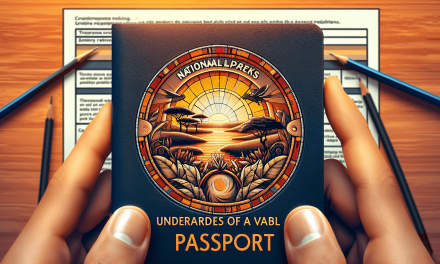So you’re planning a trip to Zambia and you’re wondering if you should take malaria prophylaxis. It’s a valid question, considering that the country has a high risk of malaria transmission. But before you make any decisions, let’s take a closer look at the situation. Malaria is a serious and potentially life-threatening disease, so it’s important to understand the risks and take appropriate measures to protect yourself. In this article, we will explore the factors that contribute to the prevalence of malaria in Zambia and discuss the different options available for preventing the disease. By the end, you’ll have a better understanding of whether or not you need to take malaria prophylaxis when visiting Zambia.

Overview of Malaria in Zambia
Malaria is a prevalent disease in Zambia and poses a significant health risk to travelers. It is a mosquito-borne infectious disease caused by the Plasmodium parasite. The most common species of Plasmodium in Zambia is Plasmodium falciparum, which is known to cause severe malaria.
Transmission of Malaria
Malaria is transmitted through the bites of infected female Anopheles mosquitoes. These mosquitoes are prevalent in Zambia, particularly in rural and peri-urban areas with abundant standing water. The risk of contracting malaria is highest during the rainy season when mosquito populations thrive.
Prevalence of Malaria in Zambia
Malaria is hyperendemic in Zambia, meaning that it is present throughout the year and poses a significant public health burden. According to the World Health Organization (WHO), Zambia accounted for approximately 4% of the global malaria cases in 2019. The disease is a major cause of illness and death, particularly among young children and pregnant women.
High-Risk Areas
While malaria is present throughout Zambia, certain regions have a higher prevalence of the disease. The provinces most affected by malaria include Luapula, Northern, and Muchinga. Additionally, rural areas, particularly those near bodies of water, are at an increased risk of malaria transmission.
Symptoms and Complications
Malaria can cause a wide range of symptoms, including fever, chills, headache, muscle aches, and fatigue. If left untreated, it can progress to severe malaria, which can lead to organ failure, coma, and death. Children and individuals with compromised immune systems are particularly vulnerable to severe malaria.
Malaria Prophylaxis Options
Taking malaria prophylaxis is crucial when traveling to areas with a high risk of malaria transmission, such as Zambia. Several medications are available for malaria prevention, and the choice of prophylaxis depends on various factors.
Different types of malaria prophylaxis
The main types of malaria prophylaxis medications include doxycycline, mefloquine, atovaquone-proguanil, and primaquine. Each medication has its own efficacy, side effects, and suitability for different individuals.
Effectiveness of different medications
The effectiveness of malaria prophylaxis medications varies depending on the specific medication and the level of drug resistance in the region. It is essential to choose a medication that is effective against the prevailing strain of malaria in Zambia.
Considerations when choosing prophylaxis
When selecting a malaria prophylaxis medication, consider factors such as your medical history, allergies, potential side effects, duration of travel, and personal preferences. It is advisable to consult a healthcare professional for personalized advice based on these factors.
Risk Assessment
Assessing your personal risk of contracting malaria is crucial before traveling to Zambia. Several factors contribute to your risk level, and understanding these factors will help you make informed decisions about malaria prevention.
Personal health factors to consider
Individuals with certain medical conditions, such as immunocompromised individuals or pregnant women, may have a higher risk of experiencing severe malaria if infected. It is important to take these factors into account when assessing your risk and choosing appropriate prophylaxis.
Duration and purpose of the visit
The length and purpose of your visit play a role in determining your risk of contracting malaria. Short visits or urban stays may carry a lower risk compared to longer stays in rural or high-transmission areas.
Activities and destinations in Zambia
Different activities and destinations in Zambia may vary in terms of malaria risk. For example, safari trips to national parks may expose you to a higher risk of mosquito bites compared to urban tours. Consider the specific locations and activities you plan to engage in when evaluating your risk.
Recommended Malaria Prophylaxis
Consulting a healthcare professional is essential to receive personalized advice on the most suitable malaria prophylaxis for your trip to Zambia. Healthcare professionals are familiar with the latest guidelines from health organizations and can recommend the most effective medication for your circumstances.
Medical professional’s advice
A healthcare professional, such as a travel medicine specialist or a general practitioner, can provide tailored advice based on your risk assessment and medical history. They will take into account your individual circumstances and recommend the most appropriate malaria prophylaxis.
Guidelines from health organizations
International health organizations, such as the Centers for Disease Control and Prevention (CDC) and the World Health Organization (WHO), provide guidelines for malaria prophylaxis in different regions. These guidelines are based on extensive research and can serve as a useful resource when discussing medication options with a healthcare professional.

Common Malaria Prophylaxis Medications
Several medications are commonly used for malaria prophylaxis in Zambia. Each medication has its own specific characteristics, including efficacy and potential side effects.
Doxycycline
Doxycycline is an antibiotic that can also be used as a malaria prophylaxis medication. It is taken once daily and is effective against chloroquine-resistant malaria. However, it may cause side effects such as photosensitivity and gastrointestinal symptoms.
Mefloquine
Mefloquine is an antimalarial drug that is taken once weekly. It is effective against multiple strains of malaria, including chloroquine-resistant malaria. Some individuals may experience side effects such as dizziness, vivid dreams, or psychiatric symptoms.
Atovaquone-Proguanil
Atovaquone-proguanil is a combination medication taken once daily. It is highly effective against chloroquine-resistant malaria and has a low incidence of side effects. However, it may not be suitable for individuals with certain medical conditions.
Primaquine
Primaquine is an antimalarial drug used for specific purposes, such as preventing relapse of Plasmodium vivax or Plasmodium ovale malaria. It is not suitable for everyone and requires careful evaluation of medical history and glucose-6-phosphate dehydrogenase (G6PD) status due to the risk of hemolytic anemia.
Side Effects and Precautions
Malaria prophylaxis medications may carry potential side effects and require certain precautions, depending on the specific medication and individual circumstances.
Potential side effects of malaria prophylaxis
Side effects of malaria prophylaxis medications can vary from mild to severe. Common side effects include gastrointestinal discomfort, headache, dizziness, and skin reactions. It is essential to be aware of potential side effects and report any concerning symptoms to a healthcare professional.
Precautions for individuals with certain medical conditions
Some medical conditions or medications may contraindicate the use of certain malaria prophylaxis medications. For example, individuals with a history of psychiatric disorders may need to avoid mefloquine due to the potential for psychiatric side effects. It is important to disclose your complete medical history to a healthcare professional to ensure the appropriate choice of prophylaxis.
Drug interactions and contraindications
Certain medications, including some antibiotics and antacids, may interact with malaria prophylaxis medications. It is crucial to inform your healthcare professional about all medications you are currently taking to prevent potential drug interactions. Additionally, some medications may be contraindicated in individuals with specific medical conditions, such as liver or kidney disease.

Alternatives to Malaria Prophylaxis
If you cannot take or prefer not to take malaria prophylaxis medications, there are alternative measures to reduce your risk of contracting malaria.
Insect Repellents
Using insect repellents containing DEET, picaridin, or other effective ingredients can help repel mosquitoes and reduce the risk of bites. Apply the repellent to exposed skin and clothing according to the manufacturer’s instructions.
Mosquito Nets
Sleeping under a mosquito net, particularly one treated with insecticide, can provide an additional layer of protection against mosquito bites while you sleep.
Protective Clothing
Wearing long-sleeved shirts, long pants, socks, and closed-toe shoes can minimize exposed skin and reduce the risk of mosquito bites. Light-colored clothing may be less attractive to mosquitoes.
Avoiding peak mosquito activity
Mosquitoes that carry malaria are most active during dusk and dawn. Avoid outdoor activities during these times, or take extra precautions to protect yourself, such as wearing insect repellent and using mosquito nets.
Additional Malaria Prevention Measures
In addition to individual measures, there are broader strategies for malaria prevention that can be implemented at a community level.
Behavioral precautions
Promoting awareness of malaria and encouraging behaviors such as seeking prompt diagnosis and treatment, sleeping under insecticide-treated nets, and draining standing water sources can contribute to reducing malaria transmission.
Environmental control methods
Efforts to control mosquito populations can involve measures such as larviciding, which involves treating mosquito breeding sites with insecticides, and indoor residual spraying, which targets adult mosquitoes.
Education and awareness
Raising awareness about malaria, its transmission, and prevention measures is crucial in reducing malaria cases. Education campaigns can target both local communities and travelers, emphasizing the importance of malaria prevention and early treatment.
Consulting a Healthcare Professional
Before making any decisions regarding malaria prophylaxis, it is crucial to consult a healthcare professional. They can provide personalized advice based on your individual circumstances and help you make informed decisions regarding prophylactic measures.
Importance of seeking medical advice
While there is a wealth of information available online, consulting a healthcare professional ensures that you receive accurate and up-to-date advice tailored to your specific needs. They can guide you through the risk assessment process and recommend the most suitable malaria prophylaxis based on your health, itinerary, and personal preferences.
Discussing personal circumstances and medical history
During the consultation, be prepared to discuss your personal circumstances and medical history in detail. This information will help the healthcare professional assess your risk of malaria and select the most appropriate prophylaxis.
Getting prescriptions and necessary vaccinations
If malaria prophylaxis is deemed necessary, the healthcare professional can prescribe the appropriate medication and provide instructions on its use. They can also advise on other vaccinations or preventive measures that may be necessary for your trip to Zambia.
Conclusion
When deciding whether to take malaria prophylaxis when visiting Zambia, it is essential to consider your personal risk factors, the prevalence of malaria in the region, and the available prevention options. Balancing the benefits and risks of malaria prophylaxis is a personal decision that should be based on a comprehensive risk assessment and guidance from healthcare professionals. It is important to seek ongoing medical guidance during your trip to ensure the most effective malaria prevention measures are in place. By taking proactive measures and seeking appropriate advice, you can reduce the risk of contracting malaria and enjoy your time in Zambia with peace of mind.












